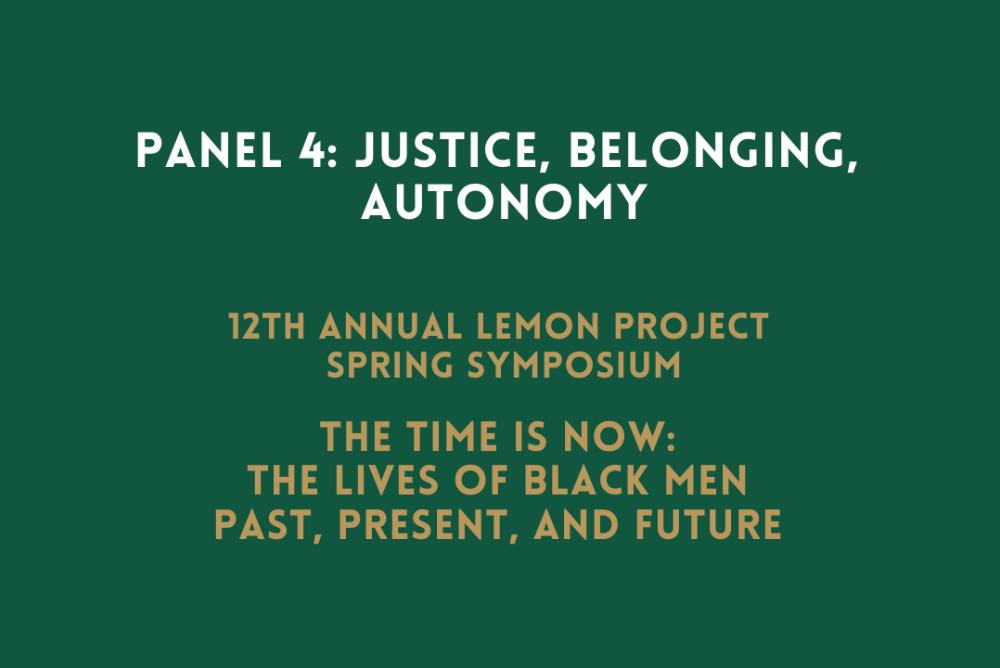The Lemon Project Events
[PAST EVENT] 12th Annual Lemon Project Spring Symposium Panel 4: Justice, Belonging, Autonomy
Location
School of Education, In person at Dogwood Room and Virtual over Zoom301 Monticello Ave
Williamsburg, VA 23185Map this location
Access & Features
- Free food
- Open to the public
- Registration/RSVP

Panel 4: Justice, Belonging, Autonomy
12th Annual Lemon Project Spring Symposium
To join virtually, please register now.
To join in person, please register here.
JaeKur Lockhart, (he, him, his) Student Success Coach, The University of Missouri - Columbia, We Still Need the Village: Black Male Success Initiatives in Higher Education
The African proverb, “It takes a village to raise a child,” perfectly encapsulates the structure needed to assist Black men achieve success at the collegiate level. A recent study done by the Southern Region Education Board (SREB) states that the graduation rate for Black males is 59% which represents the lowest rate among all college demographics in this country. However, when an institution provides resources and an infrastructure to support Black men, the results are truly amazing. This presentation will examine a Black Male Success Initiative called Brother 2 Brother that has seen an incredible 93% retention rate and 88% graduation rate among its participants. The presenters will discuss the many dimensions that make the program both popular and successful.
Jesse Bulluck, (He, Him, His) Ph.D. student, Texas Tech University, Transformative Educational Experiences: Empowering Young Black Men to Excel in the Classroom and Beyond
Over the last two decades, schools have used a zero-tolerance approach in disciplining students. This approach relies heavily on deterring unwanted negative student behavior in schools, but the harsher punishments have resulted in an increase in the criminalization of student behavior. For decades, mostly young Black males have received the majority of the punishments from schools (Camera, 2020). The disproportionate number of Black youths receiving the punitive punishments is both alarming and is something that needs an immediate change. Research highlights a direct link between school disciplinary issues, due to the zero-tolerance policies, and future contacts with the juvenile justice and the criminal justice systems (Monahan, Vanderhei, Bechtold, & Cauffman, 2014; Cuellar & Markowitz, 2015). This research study is important because it considers the lived experiences of young Black men, looking at how they have been disciplined and treated within school settings. With schools now moving away from punitive disciplinary practices, it is imperative that the conversation include strategies to ensure a significant reduction in the number of suspensions, expulsions, and arrests of young Black males from schools. This research will highlight ways that the current practices can be changed to create a better school environment for young Black males.
Brandon Alston, (he, him, his) Ph.D. candidate, Northwestern University, “The Camera is My Weapon:” How Black Men Use Cellphones to Negotiate Safety and Status Amid Police Surveillance
Although black men are disproportionately represented in cellphone-generated videos depicting police violence, existing research has neglected to document how black men use cellphones to mitigate risk during police encounters and the impact cellphone recording has within black communities. This article intervenes to examine how the threat of police violence shapes black men’s use of cellphones during police stops and the social dynamics that emerge as a result of cellphone recording. Drawing on ten months of fieldwork and 70 in-depth interviews with black men in the living on the South Side of Chicago, this article finds that vulnerability to police violence shapes men’s appropriation of cellphones to negotiate their safety and status as men. Armed with their cellphones as an instrumental tool against police violence, men use their cellphones to protect against institutional and interpersonal acts of harm, a strategy I refer to as “protective monitoring.” In monitoring police for safety, men also use cellphones as a symbolic resource to project a multidimensional expression of manhood tied to community protection, service, and resistance. By deploying their cellphones during police interventions, men mitigate some of the consequences of criminalization, appeal to the dominant gender expectations, and reinforce social ties.
Don Brien Gatewood, Cofounder and Executive Director of The Initiative Baltimore, Black Men in Local, State and National Politics
The Initiative: Baltimore (TIB) is committed to advancing the Baltimore community by helping create the next generation of community leaders through youth education and mentorship. We were founded in response to the culmination of issues affecting Baltimore starting after the protests after the death of Freddie Gray while he was in police custody and the continuing uptick in violence in the city since then. We do not want to see a generation of young men lost to violence, lack of job opportunities and other barriers. Our vision for Baltimore is a community where all citizens are educated about the political system, encouraged to develop community-driven solutions and vote; to that end, our mission focuses on inspiring young men to lead their communities through civic engagement, community development, volunteerism and community leadership. Our vision is more relevant than ever in channeling the frustrations of being a young black male in today’s society into positive action. Our mission is to inspire young black men to lead their communities through civic engagement, community development, volunteerism, and community leadership.
Contact
Sarah Thomas, setho2@wm.edu
